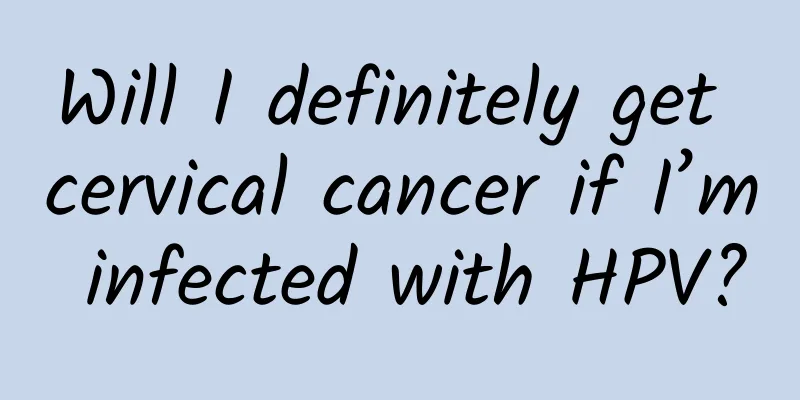Will I definitely get cervical cancer if I’m infected with HPV?

|
Editor's Note: "She" can be found in every post, and every progress of society is inseparable from the hard work of "her". As the International Women's Day is approaching, we should pay special attention to and care about the health of every woman. This newspaper invites relevant experts to conduct popular science on gynecological diseases and skin problems that trouble women. We hope that this knowledge can build a solid health defense line in daily life, allowing more women to embrace a better life in the best condition. March 4th is the eighth International Human Papillomavirus (HPV) Awareness Day, and this year's theme is "one less worry". With the continued development of the event and the advancement of the World Health Organization's "Global Strategy to Accelerate the Elimination of Cervical Cancer", people are paying more and more attention to HPV. More and more people know that persistent high-risk HPV infection is a key pathogenic factor for cervical cancer, so much so that some people directly equate HPV infection with cervical cancer, believing that once infected with HPV, you will definitely get cervical cancer. This is a misunderstanding that must be corrected. First, not all HPV infections will lead to cervical cancer. There are more than 200 known HPV subtypes, but only 14 of them have been confirmed by the World Health Organization to cause cervical cancer, known as high-risk subtypes. Other types of HPV infection will not lead to cervical cancer, but will cause diseases such as genital warts or anal condyloma acuminatum, known as low-risk subtypes. The high-risk HPV types that have been identified are 16, 18, 31, 33, 35, 39, 45, 51, 52, 56, 58, 59, 66, and 68. Second, persistent infection with high-risk HPV is only a necessary condition for the occurrence of cervical cancer, but not a sufficient condition. In other words, if you are not infected with high-risk HPV in this life, you will not get cervical cancer. This is true in most cases, especially cervical squamous cell carcinoma. However, there are currently some types of cervical cancer (such as cervical clear cell carcinoma, neuroendocrine carcinoma, etc.) that may not be related to HPV infection. In short, being infected with high-risk HPV does not necessarily lead to cervical cancer. The occurrence of cervical cancer also involves the body's immune defense capabilities. The occurrence of cervical cancer and precancerous lesions is the result of a game between invading viruses from the outside and the body's immune capabilities. Third, after clarifying that HPV is the pathogenic virus of cervical cancer, we can call high-risk HPV the culprit and other factors related to cervical cancer as accomplices, and classify them. One type of factor increases the risk of HPV infection in women, such as young age of first sexual intercourse and multiple sexual partners; another type of factor reduces the body's immune ability, such as smoking, alcoholism, drug abuse, staying up late for a long time, irregular life, and high work pressure. The increase and decrease of one may lead to infection with high-risk HPV and it is difficult to eliminate it. If it is not taken seriously, it will eventually develop into cervical cancer. Fourth, you need to pay attention to HPV, but don't be too afraid. Data shows that the cumulative chance of women being infected with HPV in their lifetime is 40%-80%, which means that most women will "unexpectedly encounter" HPV more than once at some point in their lives. Fortunately, 80% of women infected with HPV will have the virus in their bodies cleared by the immune system within 8-12 months. Therefore, some people compare cervical HPV infection to a cold on the cervix. Fifth, among women infected with high-risk HPV, a small number of women will have persistent HPV infection, and some will develop into cervical precancerous lesions. If left untreated, some of them will develop into cancer. It is generally believed that the natural course from HPV infection to the development of cervical cancer is 8-10 years. This actually gives doctors and patients enough time to discover the problem. It can even be said that late-stage cervical cancer is caused by the patient's negligence. For example, elderly women after menopause think that they will not have gynecological problems after giving birth to children and menopause, so naturally they will not go for physical examinations or screening. Sixth, to some extent, if only HPV infection is found, or only mild cervical precancerous lesions are found, it can be said that the patient will not die from cervical cancer in this life. Because the "enemy" (HPV infection) is discovered at a very early stage, the patient will definitely not sit idly by and will have regular checkups. Once a problem occurs, the doctor will deal with it in time to prevent the occurrence of cervical cancer. In short, being infected with HPV does not necessarily mean you will get cervical cancer. We need to pay attention to HPV infection, but we should not be too afraid or worried. (The author Tan Xianjie is the deputy director of the Department of Obstetrics and Gynecology, Peking Union Medical College Hospital, and the chief physician of the Gynecologic Oncology Center) |
>>: How to relieve dry throat and sore throat? Is drinking more water enough?
Recommend
How can women reduce fat around their waists?
Thin legs and thin waist are a goal that many wom...
The dangers of wearing high heels frequently
High heels are loved by every female friend. Wear...
Be careful of these 5 walking postures, there may be something wrong with your body
Reviewer: Zhang Jianzhong, Chief Physician, Beiji...
How to enlarge breasts after childbirth
When I was a child, I was very inferior because I...
Early treatment methods for uterine fibroids
Clinically, although uterine fibroids are a commo...
Can pregnant women drink Lanqin oral liquid?
The situation of pregnant women is very special. ...
Not all women can take Wuji Baifeng Pills
For many women, the medicine Wu Ji Bai Feng Wan i...
Pain below 20 days after delivery
If you still feel pain down there 20 days after d...
What causes women's stomach pain?
Mild stomach pain in women will not affect their ...
Many people are using it to "prevent sudden death". Is it really effective to eat it after staying up late?
It has to be said that coenzyme Q10 is indeed ver...
What to do if you can't urinate after a normal birth
We all know that it is very easy for women to hav...
How long does it take to get clean after a total hysterectomy?
After a hysterectomy, women need to pay attention...
What medicine is good for vaginal fungal infection?
Vaginitis is a common gynecological disease among...
Is it okay to take diet pills while breastfeeding?
If a breastfeeding mother wants to lose weight by...
How long does the temperature rise during ovulation last?
The ovulation period is a bit like a small menstr...









